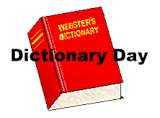.jpg)
Dates
Definition: Dates mark the time at which events occur. The Bible expresses dates in relation to the lifetime of individuals, the period during which certain rulers were in office, or other notable events. It contains the only complete chronology reaching back to the time of Adam’s creation. Bible chronology also pinpointed in advance the time when certain important events in the fulfillment of God’s purpose would take place. The Gregorian calendar, which is now popular in much of the world, did not come into use until 1582. In secular sources there is disagreement on dates given for events in ancient history. However, certain key dates, such as 539 B.C.E. for the fall of Babylon, and hence 537 B.C.E. for the Jews’ return from captivity, are well established. (Ezra 1:1-3) Using such dates as starting points, it is possible to express in terms of current calendars the dates for ancient Biblical events.
date
1 [deyt]  Show IPA noun, verb, dat⋅ed, dat⋅ing.
Show IPA noun, verb, dat⋅ed, dat⋅ing.–noun| 1. | a particular month, day, and year at which some event happened or will happen: July 4, 1776 was the date of the signing of the Declaration of Independence. |
| 2. | the day of the month: Is today's date the 7th or the 8th? |
| 3. | an inscription on a writing, coin, etc., that shows the time, or time and place, of writing, casting, delivery, etc.: a letter bearing the date January 16. |
| 4. | the time or period to which any event or thing belongs; period in general: at a late date. |
| 5. | the time during which anything lasts; duration: The pity is that childhood has so short a date. |
| 6. | an appointment for a particular time: They have a date with their accountant at ten o'clock. |
| 7. | a social appointment, engagement, or occasion arranged beforehand with another person: to go out on a date on Saturday night. |
| 8. | a person with whom one has such a social appointment or engagement: Can I bring a date to the party? |
| 9. | an engagement for an entertainer to perform. |
| 10. | dates, the birth and death dates, usually in years, of a person: Dante's dates are 1265 to 1321.
| 11. | to have or bear a date: The letter dates from 1873. |
| 12. | to belong to a particular period; have its origin: That dress dates from the 19th century. The architecture dates as far back as 1830. |
| 13. | to reckon from some point in time: The custom dates from the days when women wore longer skirts. |
| 14. | to go out socially on dates: She dated a lot during high school.
| 15. | to mark or furnish with a date: Please date the check as of today. |
| 16. | to ascertain or fix the period or point in time of; assign a period or point in time to: The archaeologist dated the ruins as belonging to the early Minoan period. |
| 17. | to show the age of; show to be old-fashioned. |
| 18. | to make a date with; go out on dates with: He's been dating his best friend's sister.
| 19. | to date, up to the present time; until now: This is his best book to date. |
| 20. | up to date, in agreement with or inclusive of the latest information; modern: Bring us up to date on the news.
Word Origin & History date (2) "fruit," c.1290, from O.Fr. date, from O.Prov. datil, from L. dactylus,from Gk. daktylos "date," orig. "finger, toe," because of fancied resemblance between oblong fruit of the date palm and human digits. Possibly from a Sem. source (cf. Heb. deqel, Aram. diqla,Arabic daqal "date palm") and assimilated to the Gk. word for "finger." |
|
|
|
.jpg)
 Show IPA noun, verb, dat⋅ed, dat⋅ing.
Show IPA noun, verb, dat⋅ed, dat⋅ing.
No comments:
Post a Comment